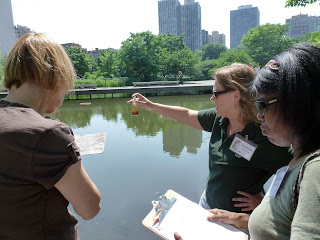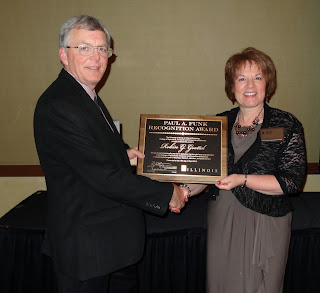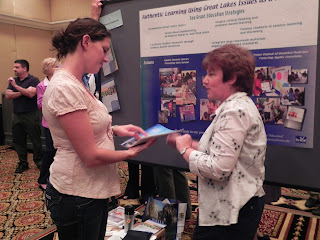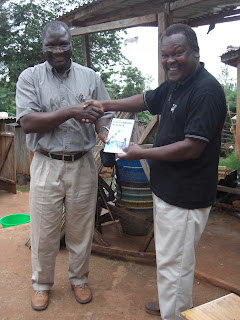July 16th, 2013 by Irene Miles
“Thank you for providing an awesome, informative, and very educational workshop,” said one teacher after last month’s B-WET field experience. “It was extremely helpful to me and, as a result, I feel very confident in addressing my students regarding the Great Lakes, knowing that now I have a plethora of resources, information, lessons, etc. at my disposal.”
All of the attendees at this year’s B-WET Field Experiences for Watershed Educators workshop shared similar positive feedback on the experience, and were genuinely excited at the opportunity to expand their science lessons. IISG’s education team led last month’s four-day training for teachers in Illinois and Indiana, where participants gained new hands-on skills and knowledge from invited speakers to take back to their classrooms.
 Teachers got to see a number of practices in action, including habitat restoration at Cowles Bog, a remediated and revitalized Roxana Marsh, water quality testing at the Peggy Notebaert Nature Museum pond, and more. They also got their hands dirty planting native species and performing a beach cleanup.
Teachers got to see a number of practices in action, including habitat restoration at Cowles Bog, a remediated and revitalized Roxana Marsh, water quality testing at the Peggy Notebaert Nature Museum pond, and more. They also got their hands dirty planting native species and performing a beach cleanup.
The workshop was designed explicitly to provide educators with a way to connect classroom concepts and scientific principles with real-world examples of watershed stewardship in action. Teachers engaged in fieldwork and collaborated with participating agency and organization educators who shared their program examples. As a result, teachers will be able to offer their students information that complements their science curricula. Additionally, the workshop gave them a chance to brainstorm new activities and lessons they could use with their students this fall.
Terri Hallesy, Illinois-Indiana Sea Grant education specialist explained, “As a result of this workshop, students will develop awareness and understanding about these critical environmental watershed issues based on the teachers’ new understandings. Educators will bring this increased confidence to their students to help excite them about engaging in Great Lakes stewardship.”
Added Rafael Rosa, Vice President of Education at the Peggy Notebaert Nature Museum, “What I was most impressed with was the enthusiasm of the teachers the program attracted. They asked great questions and more importantly were very open to sharing ideas and working with one another. I think I learned as much from them as they did from me.”
Funding was provided through a grant from the NOAA B-WET education program (linked above), and the workshop was made possible with assistance from Indiana Dunes State Park, the Great Lakes Research and Education Center at Indiana Dunes National Lakeshore, and the Alliance for the Great Lakes.
July 8th, 2013 by Irene Miles
Fifteen educators took to the water yesterday for the annual Shipboard and Shoreline Science Workshop. Scheduled for this week (July 7-13), the workshop offers teachers an opportunity to sail aboard the Lake Guardian on Lake Ontario, conducting a variety of experiments and research processes. This hands-on experience, combined with collaborative meetings with their fellow teachers, will allow each participant to take new information and approaches back to their classrooms.
Among the fifteen participants on the cruise are teachers from Illinois, and two of them wrote in to tell us about what they hope to gain from this week’s experience on Lake Ontario.
Alex Valencic, a fourth-grade teacher at Wiley Elementary school in Urbana, Illinois, looks to bring more information about the interactions between plants, animals, weather, and people to his students and his curricula.
“I’ve taught professionally for five years, first as a substitute teacher and then in my current position for the past two years. My teaching experience involves all of the core subjects, including mathematics, science, literacy, and social studies.
I first learned about the Lake Guardian workshop through a friend who works with the Illinois-Indiana Sea Grant. Some of the major topics of study for fourth graders in Illinois include learning about ecosystems, particularly how plants and animals interact with their environments, weather and global climate, and inquiry-based research. It is my hope that I’ll gain some ‘real-world’ experience studying these issues on Lake Ontario. I would like to integrate the topics into my science curriculum and challenge students to use the information about Lake Ontario to guide their study of Lake Michigan (the Great Lake that borders Illinois). While my students will not be able to go to the Great Lakes to experience the hands-on learning themselves, they will be able to use the resources gained during this workshop in their inquiry projects.”
Jen Slivka, working in the Shedd Aquarium’s learning department, is looking forward to incorporating even more science-based information and research into the exhibits at the aquarium.
“As a learning specialist, I have had the opportunity to coach teachers on inquiry-based science, create professional development sessions, and work closely with teachers on creating stewardship and citizen science programs. I feel very lucky to work with students and teachers of varying backgrounds and pass along my passion for science and education!
Prior to joining the Shedd team, I taught first grade for five years in Plano, IL. My passion for science was ignited when I attended Aurora University to earn my Masters in Teacher Leadership and Elementary Math and Science. My experiences in my graduate work led me to apply for a program through Shedd, called Teacher Field Experience: Biology in the Bahamas. Through this program, I was able to dive deep into marine environments and scientific research, first in Shedd’s classroom, and then firsthand in the Bahamas aboard Shedd’s research vessel, the R/V Coral Reef II. Through hands-on experience, I gained a greater understanding of data collection and analysis, how it applies to current scientific research and how to integrate it into my classroom curriculum. I quickly realized that teachers and educators can benefit greatly from unique professional development experiences and field work. My experiences on the Shedd’s research vessel created a desire in me to continue doing real, hands-on science, and inspire other educators to improve the science they do in their classroom. Last year I was fortunate enough to accept a learning specialist position at Shedd, which allows me the opportunity to connect with teachers all over the city of Chicago.
The Lake Guardian Sea Grant opportunity came at a perfect time. Shedd Aquarium recently unveiled a renovation of our Local Waters exhibit, titled At Home on the Great Lakes. Since Shedd is committed to education and conservation of the Great Lakes, I am thrilled with the opportunity to be able to board a research vessel and explore ecology, geology, geography, weather, and human impacts on Lake Ontario. Even though I was born and raised in Illinois, I feel that I have a lot to learn about the crucial role that the Great Lakes play in our world. I am looking forward to building my knowledge base on the Great Lakes by receiving firsthand experiences on a working research vessel. I am most looking forward to gaining new resources and discovering stewardship opportunities for students and teachers. Once I return, the knowledge and experiences I gain will be shared with the learning department, and will help to shape future programming at Shedd.”
May 30th, 2013 by Irene Miles
 IISG staffers will join hundreds of scientists, environmentalists, and government representatives June 2-6 at the Conference on Great Lakes Research. Spread across each day of the conference, their presentations will cover vital work on Sea Grant education initiatives, new tools that help officials protect aquatic ecosystems in the Great Lakes region, and more.
IISG staffers will join hundreds of scientists, environmentalists, and government representatives June 2-6 at the Conference on Great Lakes Research. Spread across each day of the conference, their presentations will cover vital work on Sea Grant education initiatives, new tools that help officials protect aquatic ecosystems in the Great Lakes region, and more.
Robin Goettel and Terri Hallesy will kick things off Tuesday morning with a close look at education strategies that improve Great Lakes literacy. Later in the session, Caitie McCoy will discuss a program piloted last year at two schools near the Grand Calumet River. The program was designed to teach students living in Areas of Concern about the science behind restoration projects. Attendees will also hear from Terri and others about Undo the Chemical Brew, a project that has collected 2.7 million unwanted pharmaceutical pills for safe disposal since 2010.
On Wednesday, members of the AIS outreach team will talk about resources they’ve developed to help water gardeners avoid invasive plants that are likely to spread in the Great Lakes. The resources are part of a larger effort to develop and implement risk assessment tools that can be used by resource managers and policy-makers to determine which commercially-sold aquatic species pose the greatest threat to the region.
IISG members will also be a part of several presentations on Wednesday and Thursday about environmental indicators communities can use to make sustainable land-use decisions. During the session, Brian Miller, Kristin TePas, and Marty Jaffe will introduce two web-based tools that help officials understand land use impacts on local aquatic environments and take steps towards securing the long-term health of the region’s natural resources.
The International Association for Great Lakes Research’s (IAGLR) 56th Annual Conference on Great Lakes Research is sponsored by IISG and Purdue University. To view the entire program, visit the conference website.
May 14th, 2013 by Irene Miles
The SeaPerch Program, sponsored by the Office of Naval Research, brings robotics and underwater science together to enhance classroom activities and curricula for a variety of grade levels. Illinois-Indiana Sea Grant recently sponsored a contest to give away several of the kits to teachers of grades 6-12.
From The Great Lakes Echo:
“The Illinois-Indiana Sea Grant offers grade 6-12 teachers a chance to win a free kit to build a remotely operated underwater vehicle. The SeaPerch kit normally costs $194.
SeaPerch, a program started about five years ago by Massachusetts Institute of Technology professors, provides remotely operated underwater vehicles and lesson plans to teachers to improve the curriculum in science, mathematics and engineering in primary education across the country.”
Follow the link above to read the complete story, and visit the SeaPerch homepage for more information about the program, including photos, video, curricula, and more.
April 22nd, 2013 by Irene Miles
 |
| IISG Director Brian Miller congratulates Robin on her award |
|
Robin Goettel, Illinois-Indiana Sea Grant’s associate director for education, was recently recognized for her career-long commitment and contributions to improving natural resources.
The Paul A. Funk Recognition Award is given annually “to faculty and academic professionals for outstanding achievement and major contributions to the betterment of agriculture, natural resources, and human systems.”
Specifically, Robin’s work has extended and expanded water information and education in Illinois by introducing water science concepts, activities, curricula, and more to students and teachers throughout the state and the Midwest.
Robin was one of three people selected for this prestigious award, and the video below highlights her achievements.
February 11th, 2013 by Irene Miles
Today’s blog post features a fun bit of physics from Wired.com’s science blog.
Writer Rhett Allain, professor at Southeastern Louisiana University, received an interesting question over Twitter – “What would happen if everyone on the planet jumped in the water?”
He writes:
“Let’s give a slightly refined version of the question.
‘If everyone on Earth went for a swim at the same time in Lake Michigan, how high would the water level rise?’
I have two primary assumptions to start with. First, I will assume that during this time the volume of water in Lake Michigan will be constant. So if the people make the water level rise, the water level will indeed rise instead of pushing water into the other Great Lakes. Second, I will assume that all of the humans in the lake are floating. If they aren’t ‘swimming’ or touching the bottom, then it will be easier to calculate the rise in the water level.”
Follow the link above for a fun Lake Michigan physics lesson.
February 7th, 2013 by Irene Miles
IISG’s Aquaculture Marketing Specialist Kwamena Quagrainie, who also directs the aquaculture economics and marketing program at Purdue University, was recently promoted to the position of Clinical Engagement Assistant Professor in Agricultural Economics. Dr. Quagrainie has been involved for many years in aquaculture marketing and outreach, helping numerous aquaculture operations get started or expand their business throughout the Midwest. He has also been involved in international efforts to promote and foster aquaculture operations throughout several African nations.
The Clinical Engagement professorship emphasizes transfer of applied research results to aquaculture communities small and large. The goal of this position is to promote active engagement in a field, which is the type of work that Dr. Quagrainie has been directly involved in for many years now. This promotion will give him even more opportunities to bring his expertise to aquaculture producers–helping businesses and communities grow.
February 4th, 2013 by Irene Miles
 SeaPerch, a program that brings underwater robotics to classrooms and demonstrates how they can be used for educational purposes, recently held a workshop at the University of Illinois Hydrosystems Laboratory. IISG’s Robin Goettel and Terri Hallesy were among the presenters and they shared a number of educational materials that teachers could combine with their classes’ underwater robots.
SeaPerch, a program that brings underwater robotics to classrooms and demonstrates how they can be used for educational purposes, recently held a workshop at the University of Illinois Hydrosystems Laboratory. IISG’s Robin Goettel and Terri Hallesy were among the presenters and they shared a number of educational materials that teachers could combine with their classes’ underwater robots.
Thirteen Champaign-Urbana science teachers were in attendance to learn how to incorporate SeaPerch underwater robots into their classroom curricula. Coordinators from Naval Sea Systems Command – Crane STEM led the morning session to introduce the SeaPerch program, provide helpful tips for constructing the complimentary robot kit each teacher received, and discuss relevant resources for classroom use. Additional robots commonly deployed for scientific applications were also highlighted.
 Over lunch, participants interacted with U of I graduate students in engineering to discuss research topics and applications for their in-class lessons. Robin and Terri shared educational resources including two COSEE Great Lakes curriculum collections, Greatest of the Great Lakes: A Medley of Model Lessons, and a Fresh and Salt activity, “I, Robot, Can Do That!”
Over lunch, participants interacted with U of I graduate students in engineering to discuss research topics and applications for their in-class lessons. Robin and Terri shared educational resources including two COSEE Great Lakes curriculum collections, Greatest of the Great Lakes: A Medley of Model Lessons, and a Fresh and Salt activity, “I, Robot, Can Do That!”
During the afternoon session, a live demonstration of the SeaPerch robot was conducted and teachers had an opportunity to operate the SeaPerch robots in the large-scale laboratory facilities.
SeaPerch is a joint program of the Office of Naval Research and the AUVSI Foundation. Visit the SeaPerch homepage to learn more about bringing underwater robotics to the classroom, and for a calendar of upcoming workshops and events.
February 1st, 2013 by Irene Miles
 The Paul A. Funk Recognition Award provides a personal award to the winner as well as funds for their department to use in support of their work benefiting natural resources and human environmental systems.
The Paul A. Funk Recognition Award provides a personal award to the winner as well as funds for their department to use in support of their work benefiting natural resources and human environmental systems.
This year, Illinois-Indiana Sea Grant’s Robin Goettel won the award for her extensive educational outreach work, including the creation of numerous curricula for science teachers and others. In particular, the Fresh and Salt curriculum, the Greatest of the Great Lakes collection of model lessons, and The Medicine Chest have helped to inform, engage, and education over 100,000 students about environmental science related to the Great Lakes.
Robin isn’t afraid to get totally immersed in her environmental education work either, as this excerpt from her nomination proves:
“No description of Robin would be complete without a mention of Zelda the zebra mussel, a ‘spokesmussel,’ as Robin describes her. Zelda is a costume that Robin is not afraid to pull out at public events. While maybe not quite ready for Disneyworld, Zelda draws a crowd. People start with a laugh, are compelled to ask questions, and end up with a better understanding of invasive species for the unconventional approach.”
Those examples don’t begin to touch on the work that Robin has engaged in throughout her many years with the program–from direct engagement with students of all grade levels, to educational displays at some of the Midwest’s biggest events, to forging partnerships with other environmental organizations to better educate, inform, and engage people in protecting and preserving natural resources.

Robin’s many years of work on environmental issues, and her dedication to fostering ever higher levels of science education for students of all ages, make her a terrific and very deserving choice for this award.








